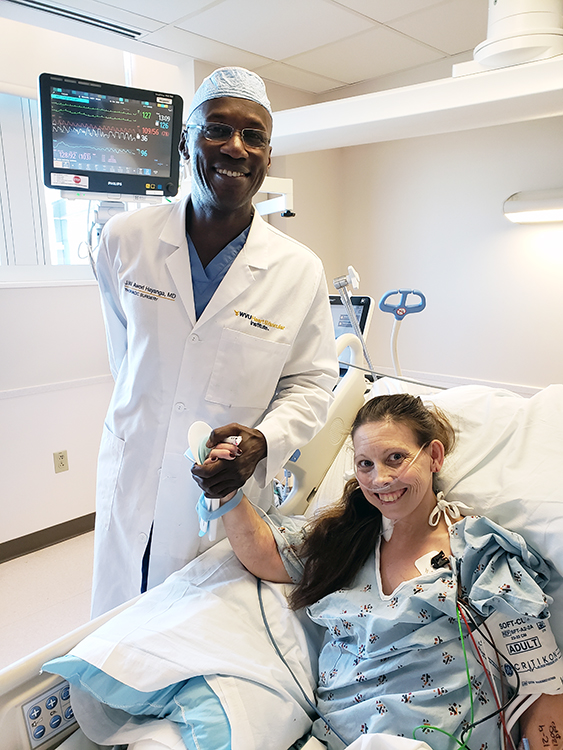WVU Heart and Vascular Institute physicians use ECMO to address complicated airway

MORGANTOWN, W.Va. – Physicians at the WVU Heart and Vascular Institute have used extracorporeal membrane oxygenation, or ECMO, to provide oxygen to a patient while she underwent rigid bronchoscopy to relieve complete airway obstruction. This is the first time ECMO has been used in the state to address a complicated airway.

According to Jeremiah Hayanga, M.D., director of the WVU Medicine ECMO program, the patient, Misty Dehaven, 34, of Buckhannon,had blockages in her lung due to complications from a combined immune deficiency and congenital pulmonary lymphangiectasia, a rare condition that causes proteins to build up in the airway and impair breathing.
Because of a recent illness, the proteins had formed into a cast, blocking her airway and preventing her from taking in oxygen or expelling carbon dioxide, putting her at risk for cardiac or pulmonary failure. In an effort to give Dehaven more time, physicians placed her on ECMO to oxygenate her blood while they performed a rigid bronchoscopy to remove the blockage.
“The patient was minutes from arrest. The only way to remove the blockage was to remove the airway from the equation and place her on ECMO so we could use the rigid bronchoscope to remove the protein cast,” Dr. Hayanga said. “It took us nearly an hour to remove the blockage, and that would never have been possible without the use of ECMO to provide oxygen.”
Once the blockage was cleared, Dehaven was intubated to give her body the chance to safely recover from the procedure and stabilize her carbon dioxide levels.
“We could easily have lost a young woman, and it would have been devastating,” Hayanga said. “The mechanical support offered us the time to work. We placed her on ECMO and extubated her, effectively excluding the ventilator. Then, we were able to work on her airway and remove the cast. We reintubated her and weaned her off ECMO. We were able to do the procedure safely, normalize her functioning, and then take her off ECMO. It has been a great result for her.”
Dehaven is no longer intubated and is recovering.
“It is wonderful to have these doctors here who can do work like this,” Dehaven said. “This technology is lifesaving, and it certainly saved me.”
The ECMO program at WVU Medicine began in 2018, is a high volume center, and is designated a Center of Excellence by the Extracorporeal Life Support Organization. The procedure has helped newborns with meconium aspiration syndrome, people waiting for heart or lung transplants, and patients with certain cardiac problems.